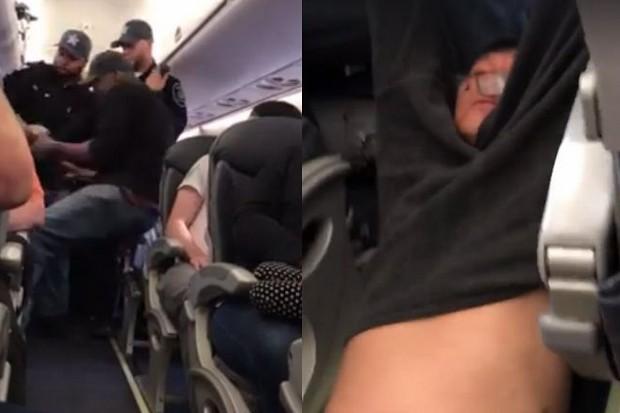
DALLAS/LONDON - Shares of United Continental Holdings Inc fell as outrage on social media over a passenger’s forcible removal from a flight spread across the globe.
The stock dropped 3.3% to $69.17 at 9.46am Tuesday in New York, marking the biggest decline on a Bloomberg index of US airlines.
Officers pulled a passenger from a flight Sunday evening after he refused to give up his seat, dragging him down the aisle as travellers yelled at them to stop. Recordings of the incident posted on social media sent people into a rage.
By Tuesday in China, the incident was a focus of social media and government editorial. The hashtag #UnitedForcesPassengerOffPlane was the top trending item on Sina Weibo, the equivalent of Twitter, with more than 270 million views. The man who was removed appeared to be of Asian descent.
The incident demonstrates how airline bumping can veer into a confrontation. Carriers around the world routinely oversell their flights because people don’t always appear for a flight. Overselling is a way to cover that situation while maximising the airline’s revenue.
The swift social media condemnation, which extended to Washington, was sparked because the man wasn’t being ejected for misbehaviour or a security threat. United said initially that the flight was overbooked, its staff chose him and he didn’t want to get bumped. The airline later said it needed room for its own employees to get to another flight.
Video posted to Facebook and Twitter showed the man being dragged out of his seat and down the aisle of Flight 3411 to Louisville, Kentucky. The man said he was a doctor and had to be in Louisville on Monday for work, according to a Twitter account by a passenger who said he was on the flight. The plane from Chicago O’Hare International Airport arrived at 10:01 p.m., almost two hours late.
China’s state mouthpiece the Global Times questioned in an editorial if "the victim’s Chinese ethnicity potentially made a difference" in how the passenger was treated. By dragging the man from the plane, officials "left the man with no dignity," the editorial said.
An online petition called "Chinese Lives Matter" calling for a US investigation into the case has garnered 38,000 signatures.
United CEO Oscar Munoz apologised on Monday for "having to re-accommodate these customers". The airline is conducting a review and seeks to resolve the matter with the man who was dragged off the aeroplane, Mr Munoz said in an emailed statement. In a subsequent message to employees, the CEO called the passenger "disruptive" and "belligerent".
United required the seats on the Chicago plane to accommodate several crew members who needed to get to Louisville to avoid cancelling other flights, spokesman Charles Hobart said. The flight wasn’t, in fact, oversold.
"It’s not something we want to do but occasionally it’s something we have to do," Mr Hobart said. "This was an instance where, unfortunately, we had to request the assistance of law enforcement because we had to get that aircraft off the ground."
United’s response didn’t satisfy senator Robert Menendez, a New Jersey Democrat, who called the incident "disturbing" and Mr Munoz’s statement an "empty apology". Eleanor Holmes Norton, a non-voting House Democrat representing the District of Columbia, called for Congressional hearings.
The incident poses an incremental risk of inviting a response from lawmakers, Buckingham analyst Daniel McKenzie wrote in a note to investors.
"It’s a brand-damaging event, but it’s unlikely investors will be able to pinpoint the fallout in UAL’s revenue production," he wrote. Shareholders are more worried about competition and whether the carrier will miss revenue targets this summer as it increases seat availability, McKenzie said.
The incident came two weeks after United drew social media scorn for enforcing its dress code for those who fly as non-revenue passengers, such as those for employees. A girl flying from Denver was told to change her leggings before boarding. In response, the airline then took efforts to tell "our regular customers" that "leggings are welcome".
United’s contract of carriage says it chooses passengers to be bumped based on a fare class, an itinerary, status in its frequent-flyer programme, "and the time in which the passenger presents him/herself for check-in without advanced seat assignment". That means those who paid more for a ticket and those who fly the airline frequently are less likely to be selected for an involuntary bump, criteria that are not unique to the Chicago-based carrier.
A volunteer is paid for the seat and booked on another flight. But if there aren’t enough volunteers, an airline resorts to the involuntary method. When it goes wrong, it can get ugly. That’s one reason at least two US airlines -- JetBlue Airways Corp and Virgin America Inc -- don’t do it.
Last year, the 12 largest US airlines bumped slightly more than 40,600 of 659.7 million passengers, for a rate of 0.62 per 10,000 passengers, down from 0.73 per 10,000 in 2015, according to the Bureau of Transportation Statistics.